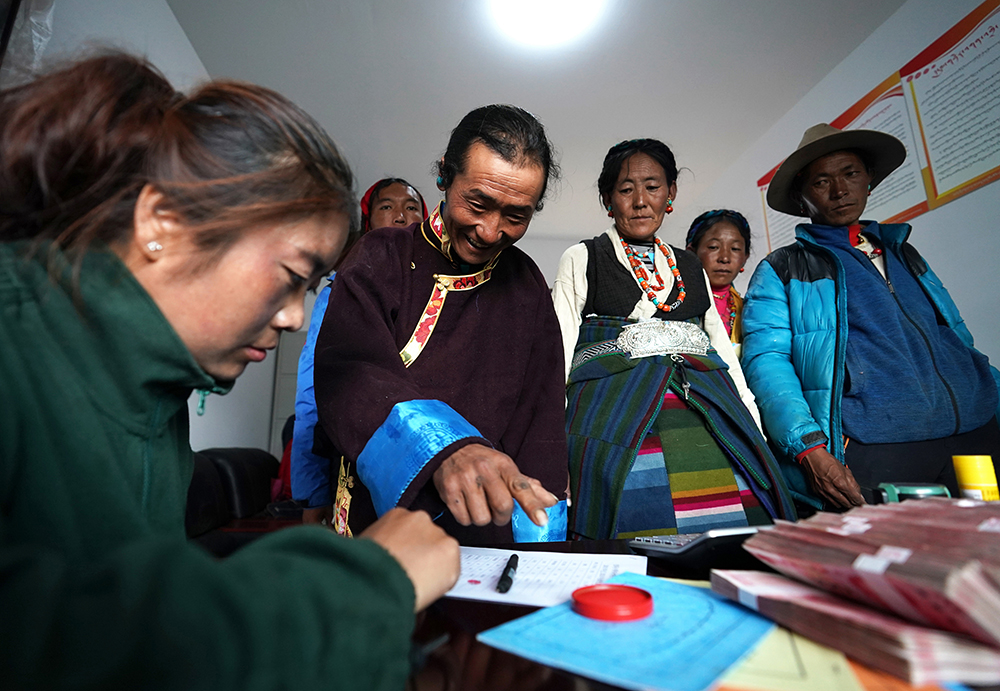Xi sets out plans for new era in Tibet


President calls for efforts to build united, prosperous, harmonious region
China has set the policy direction for developing the Tibet autonomous region in the new era, focusing its Tibet-related work on safeguarding national unity and strengthening ethnic solidarity while improving people's well-being.
Speaking at a two-day high-level symposium on Tibet-related work, which concluded in Beijing on Saturday, President Xi Jinping called for more education and guidance among the public to mobilize them in combating separatist activities, thus forging an ironclad shield to safeguard stability in the region.
Xi, who is also general secretary of the Communist Party of China Central Committee, stressed the committee's long-term commitment to Tibet to ensure the region has support from the central authorities and assistance from the whole country.
Efforts must be made to build a new and modern socialist Tibet that is united, prosperous, culturally advanced, harmonious and beautiful, Xi said.
The symposium was the seventh since 1980, when the first central symposium on Tibet-related work was held. Observers said that the central government used the latest meeting to strengthen the full implementation of its strategy in governing Tibet to allow the region to be part of the country's high-level development.
In his speech at the symposium, Xi called for efforts to ensure national security and long-lasting peace and stability, steadily improve people's livelihoods, strengthen border defense and ensure frontier security.
He underlined the importance of strengthening patriotic education in all schools, and required continuous efforts to enhance awareness of the motherland, the Chinese nation, Chinese culture, the CPC and socialism with Chinese characteristics among people of all ethnic groups.
Tibetan Buddhism should be guided in adapting to the socialist society and should be developed in the Chinese context, Xi said.
On the socioeconomic development of Tibet, he stressed the need to speed up high-quality development, consolidate the achievements made in poverty alleviation, and protect the ecology of the Qinghai-Tibet Plateau.
A number of major infrastructure projects and public service facilities will be completed, including the Sichuan-Tibet Railway, Xi said.
Galsang Drolma, a researcher of socioeconomics at the China Tibetology Research Center in Beijing, said the message Xi conveyed at the high-level meeting was clear-the central government wants to maintain enduring peace and stability in Tibet and keep meeting the aspirations of the Tibetan people for a better life despite the challenges of the region's inadequate and unbalanced development.
The researcher said the Party's leadership and the system of regional ethnic autonomy are fundamentals for Tibet's socioeconomic development. "Currently, national unity and ethnic solidarity have become a social consensus in Tibet," she said.
Thanks to consistent support and aid from around the country, Tibet has made great headway in socioeconomic development, and all of its 74 poverty-stricken counties have been lifted out of poverty, the researcher said. "People's livelihoods keep improving, and all this demonstrates the great practice of the Party's people-centered philosophy in Tibet," she said.
More than 18,000 officials and professionals have been sent to Tibet to help the region to develop, and their contributions largely improve the region's public services, according to the researcher.
Zhou Liping from Tianjin, who was sent to teach at a primary school in Tibet a year ago, said she has witnessed the efforts of her peers from around the country to help the region develop in various sectors as well as the great achievements Tibet has made in the critical battle to reduce poverty.
As a teacher, Zhou said she does her utmost to strengthen her students' love for the motherland and the Chinese nation.
New chapter
Since the 18th CPC National Congress in 2012, the CPC Central Committee, with Xi at the core, has worked out a series of policies and strategies for social stability, border development, ecological protection and ethnic unity in Tibet, and has opened a new chapter in improving governance, stability and people's well-being in the region.
On March 9, 2013, when joining the delegation from Tibet in a panel discussion at the first session of the 12th National People's Congress, Xi said, "To govern the country well we must first govern the frontiers well, and to govern the frontiers well we must first ensure stability in Tibet."
A meeting of the Political Bureau of the CPC Central Committee Xi presided over on July 30, 2015, discussed economic and social development in Tibet and how to ensure the region achieves long-term stability.
In a key speech at the sixth central symposium on Tibet-related work in August 2015, he defined guiding principles, objectives and tasks for developing Tibet in the new era. Ever since then, Tibet has made comprehensive progress and historic achievements on its way toward sustained stability and prosperity.
While carrying out national development plans, the central government has also paid special attention to Tibet and allowed the region to build some major infrastructure projects that suit local conditions and benefit local residents.
In a congratulatory letter to the Forum on the Development of Tibet in June last year, Xi expressed his hope that Tibet would seize the opportunities for development, build a beautiful and happy region, see the flourishing of its fine traditional culture and protect the plateau's ecological environment. He also urged the region to implement a more active opening-up policy and develop extensive international exchanges and cooperation.
Galsang Drolma said that given the grave and complex international situation, Tibet should firmly uphold opening-up, and at the same time align itself with the huge domestic market for further development.
Tseyang, a farmer from Bagchib, a village in Bagyib township of Nyingchi city in southeastern Tibet, said he was happy to learn through watching television about the just-concluded central symposium on Tibet-related work.
Thanks to the Party's leadership and policy support from the central authorities, dramatic changes have taken place in his village and throughout Tibet, he said.
"We are living a happy life, and we want to thank General Secretary Xi and the CPC Central Committee," he added.


